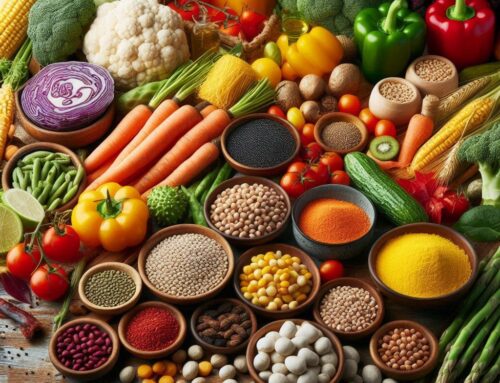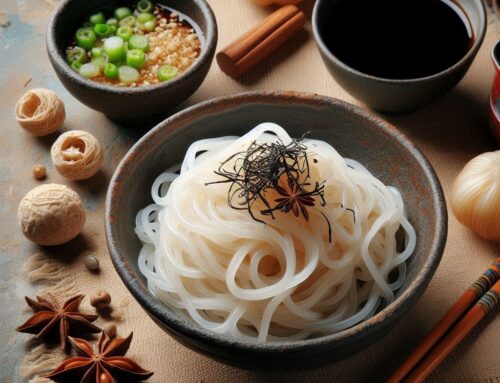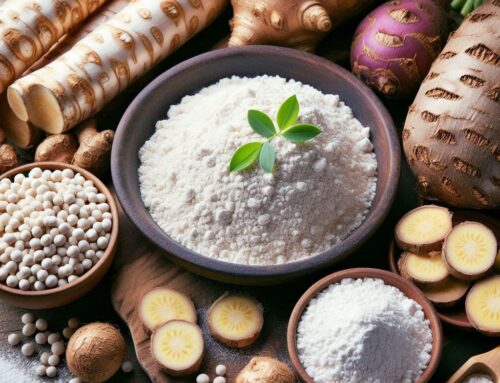
Introduction to Konjac Jelly and Its Popularity
Konjac jelly, a fascinating food product derived from the konjac root, has been gaining widespread popularity as a low-calorie snack option. Originating from Asia, this unique jelly is celebrated for its high dietary fiber content and minimal calorie count, making it an appealing choice for those seeking healthier snack alternatives.
The konjac root, also known as Amorphophallus konjac, is rich in glucomannan—a water-soluble dietary fiber that contributes to the jelly’s distinctive texture and health benefits. This fiber not only aids in digestion but also promotes a feeling of fullness, which can be particularly beneficial for weight management.
In various Asian countries, konjac jelly has become a staple due to its versatility and health benefits. It can be found in an array of flavors and forms, ranging from sweet treats to savory snacks. Its ability to satisfy cravings without adding extra calories has made it a favorite among health-conscious consumers.
As more people around the world become aware of its advantages, konjac jelly continues to grow in popularity beyond Asia. Whether enjoyed on its own or incorporated into recipes as a creative ingredient, this innovative snack offers an excellent way to indulge without compromising on nutritional goals.
Nutritional Benefits of Konjac Jelly
Konjac jelly, a popular dietary product, is gaining recognition for its remarkable nutritional benefits, primarily due to its high content of glucomannan fiber. This natural, water-soluble dietary fiber is derived from the root of the konjac plant and has been used in traditional Asian cuisine for centuries. One of the most notable benefits of glucomannan is its role as a weight loss aid. By absorbing water and expanding in the stomach, it promotes a feeling of fullness that can help reduce overall calorie intake.
Beyond weight management, konjac jelly also contributes to cholesterol management. Studies have shown that glucomannan can help lower LDL cholesterol levels by binding to bile acids in the gut and facilitating their excretion from the body. This process encourages the liver to use excess cholesterol to produce more bile acids, thereby reducing blood cholesterol levels.
Moreover, konjac jelly supports blood sugar control by slowing down carbohydrate absorption in the digestive tract. This results in more stable blood sugar levels post-meal and can be particularly beneficial for individuals managing diabetes or insulin resistance.
Incorporating konjac jelly into your diet can offer these health advantages while being a low-calorie option that satisfies cravings without compromising nutritional goals. As always, it’s important to pair such functional foods with a balanced diet and regular exercise for optimal health outcomes.
How Does Konjac Jelly Affect Digestion?
Konjac jelly, a popular dietary supplement and snack, has garnered attention for its potential benefits on digestive health. Rich in glucomannan, a soluble fiber derived from the konjac plant, this jelly plays a significant role in supporting the digestion process. When consumed, the fiber in konjac jelly absorbs water and expands in the stomach, creating a feeling of fullness that can aid in weight management.
The digestion process of konjac jelly begins with its ability to slow down gastric emptying. This means that food stays longer in the stomach, allowing for better nutrient absorption and providing more time for gut flora to interact with dietary components. The balance of gut flora is crucial for maintaining overall digestive health as it aids in breaking down complex carbohydrates like those found in konjac jelly.
Moreover, as glucomannan passes through the digestive tract largely undigested until it reaches the colon, it acts as a prebiotic. This means it serves as food for beneficial bacteria within our guts, promoting a healthy gut flora balance. By supporting these good bacteria through fiber intake from foods like konjac jelly, individuals may experience improved regularity and reduced symptoms of constipation.
In summary, incorporating konjac jelly into one’s diet may positively impact digestive health by enhancing fiber intake and promoting a balanced gut flora environment. However, it’s important to consume it with adequate water to prevent any potential gastrointestinal discomfort due to its high absorbency nature.
The Possible Side Effects: Can Konjac Jelly Cause Diarrhea?
Konjac jelly, a popular dietary supplement known for its low-calorie content and high fiber levels, has gained attention for both its potential health benefits and its side effects. One of the primary concerns associated with konjac is its impact on the digestive system, particularly the possibility of causing gastrointestinal issues such as diarrhea.
The root of the konjac plant contains glucomannan, a soluble fiber that expands in the stomach when consumed. While this can promote feelings of fullness and aid in weight management, it can also lead to digestive discomfort if not consumed properly. The high fiber content can be difficult for some individuals to process, potentially resulting in diarrhea causes as the body adjusts to increased fiber intake.
To minimize these konjac side effects, it’s important to introduce konjac products gradually into your diet and ensure adequate hydration. Drinking plenty of water helps glucomannan expand properly in the stomach without causing blockages or excessive gastrointestinal distress. If you experience persistent digestive discomfort or severe symptoms after consuming konjac jelly, it is advisable to consult a healthcare professional to determine whether this supplement is suitable for your dietary needs.
Tips for Consuming Konjac Jelly Safely
Konjac jelly, a popular dietary supplement known for its high fiber content and low calorie count, can be a beneficial addition to your diet when consumed properly. To ensure safe consumption of konjac jelly, it’s important to follow a few key guidelines.
Firstly, portion control is crucial. While konjac jelly is low in calories, overconsumption can lead to digestive discomfort due to its high fiber content. It’s advisable to start with small portions and gradually increase as your body adjusts. This allows your digestive system time to adapt and helps prevent potential issues such as bloating or gastrointestinal distress.
Equally important is maintaining proper hydration. Fiber absorbs water in the digestive tract, which helps it move smoothly through the system. Therefore, increasing your water intake is essential when consuming konjac jelly or any high-fiber foods. Adequate hydration aids digestion and maximizes the health benefits of fiber.
By adhering to these safe consumption tips for konjac jelly—practicing portion control and ensuring sufficient hydration—you can enjoy this nutritious snack while supporting your overall digestive health.
Who Should Avoid or Limit Konjac Jelly Intake?
Konjac jelly, a popular dietary supplement known for its low-calorie content and high fiber, can be a beneficial addition to many diets. However, it is not suitable for everyone. People with sensitive digestive systems should exercise caution when consuming konjac jelly. Due to its high fiber content, konjac jelly can cause digestive discomfort such as bloating or gas in individuals who are not accustomed to such fibrous foods. It is advisable for these individuals to introduce konjac products gradually into their diet and monitor their body’s response.
Furthermore, those with allergies to konjac root products should avoid konjac jelly altogether. Allergic reactions can range from mild symptoms like itching or hives to more severe reactions such as difficulty breathing or swelling of the throat. If you suspect an allergy, it’s important to consult with a healthcare professional before consuming any konjac-based products.
In summary, while konjac jelly offers health benefits for many people, those with sensitive digestive systems or allergies should approach its consumption carefully and consider consulting a healthcare provider if they have concerns about potential adverse effects.
Conclusion: Is Konjac Jelly Right for Your Diet?
In conclusion, determining whether konjac jelly is right for your diet depends on your individual health goals and dietary needs. Known for its low-calorie content and high fiber levels, konjac jelly can be an excellent addition for those looking to manage their weight or improve digestive health. Its main component, glucomannan, is a soluble fiber that can help promote feelings of fullness, potentially reducing overall calorie intake.
However, it’s essential to consider any dietary restrictions or allergies you may have. While konjac jelly is generally considered safe for most people, its high fiber content might cause digestive discomfort in some individuals if consumed in large quantities. Additionally, those with specific medical conditions should consult a healthcare professional before incorporating it into their diet.
As with any dietary change, moderation and balance are key. Konjac jelly can complement a healthy diet when used thoughtfully alongside other nutrient-rich foods. By understanding its benefits and limitations, you can make an informed decision about whether this unique food fits into your lifestyle and nutritional goals.






